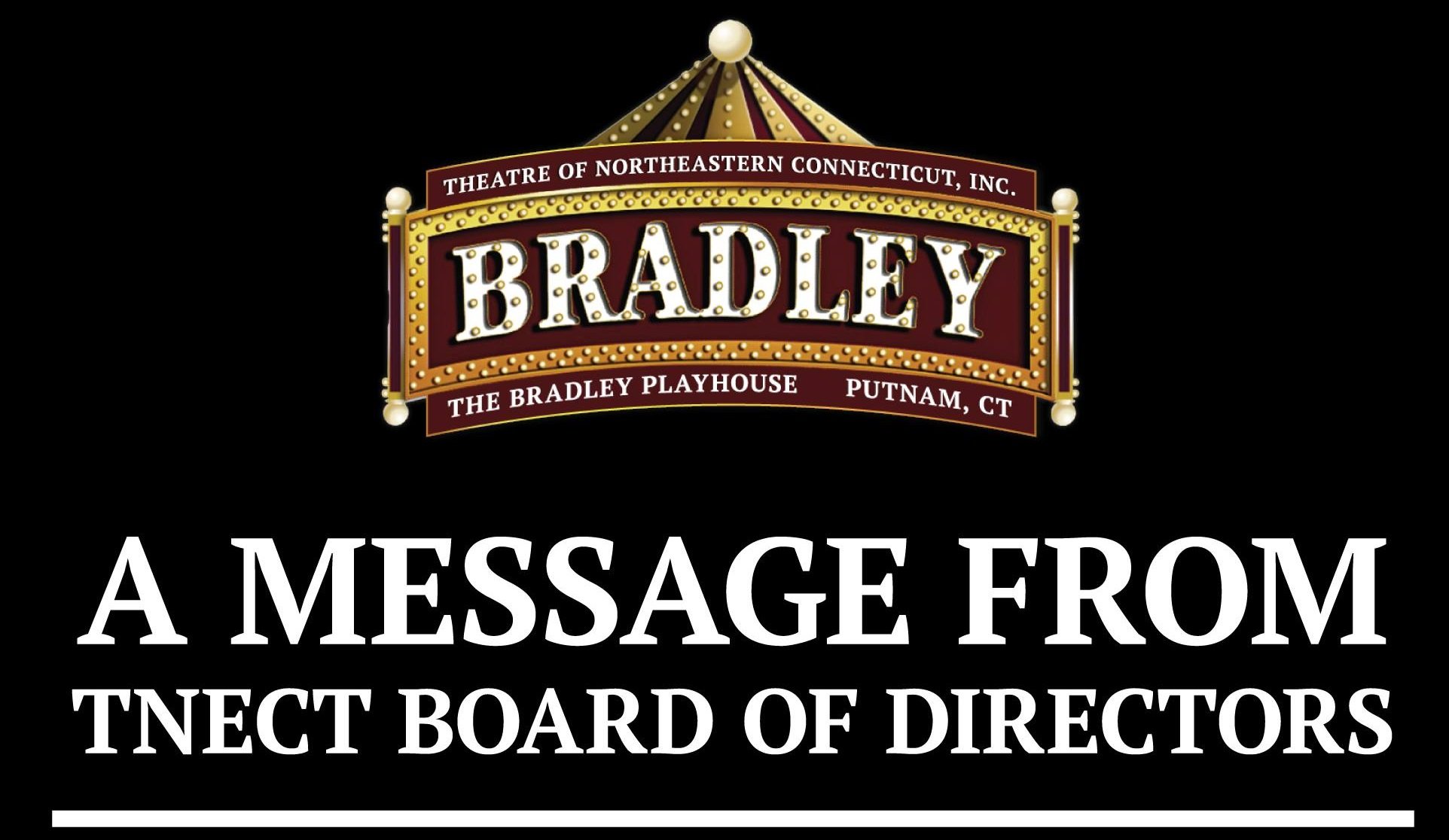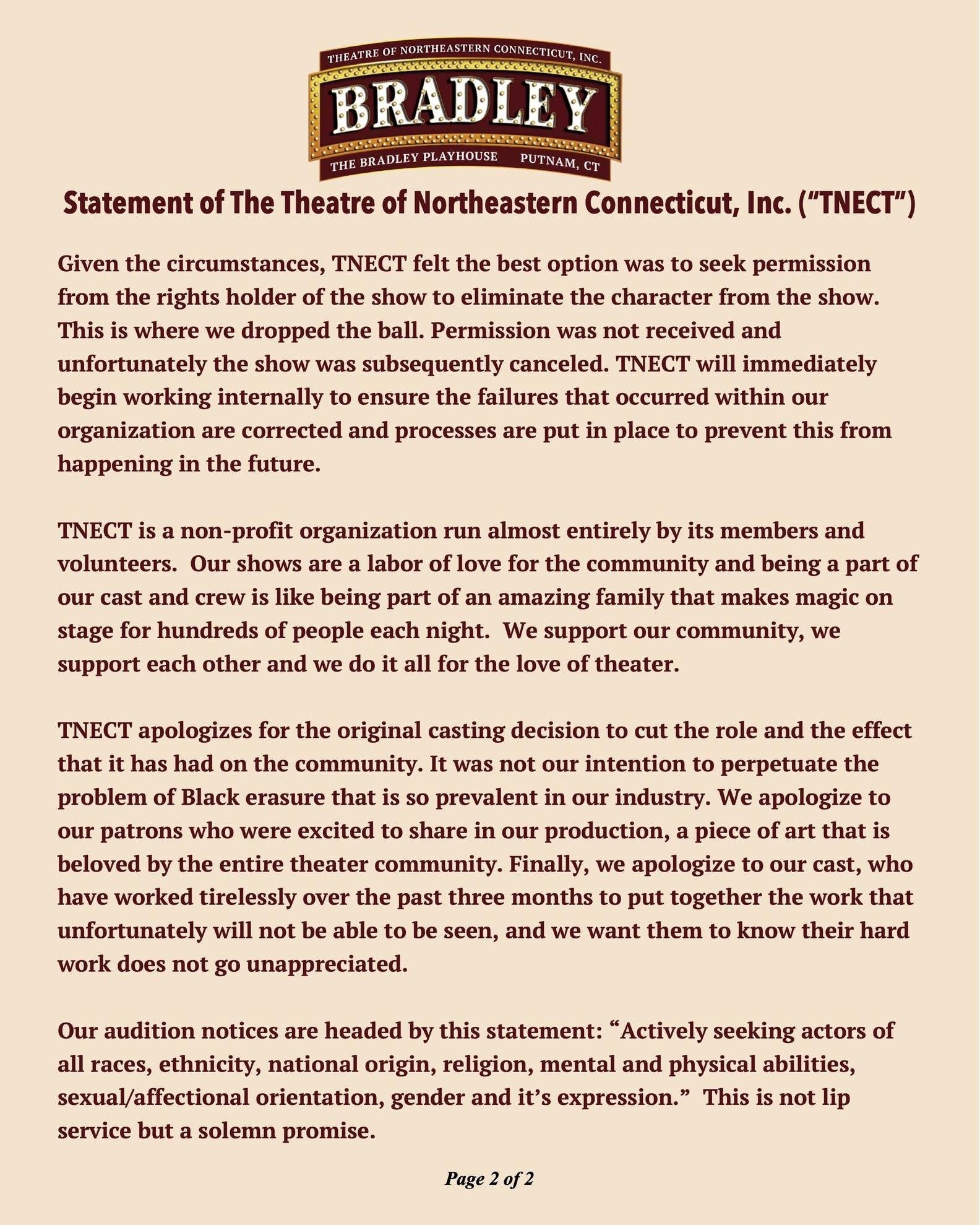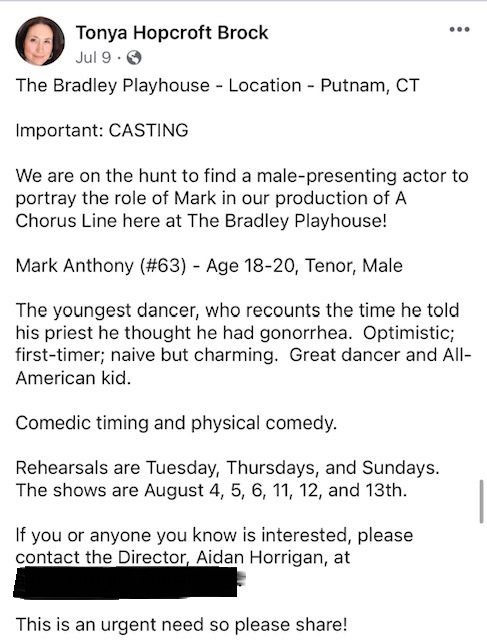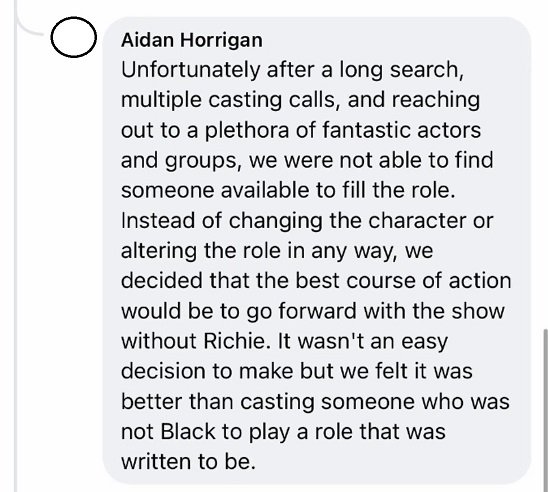Bradley Playhouse "apologizes", but only digs deeper hole
by Chris Peterson, OnStage Blog Founder
In what amounted to a Saturday morning surprise, the leadership at the Bradley Playhouse released a second statement regarding the incident involving their now-canceled production of 'A Chorus Line’. I’m sure folks at the Bradley were hoping this was going to help turn the page from this awful situation, but this new, weirdly-toned, copy-pasted, ChatGPT-styled, statement raises even more questions. It doesn’t address the real problems at the playhouse and doesn’t even begin to give any solutions.
If anything, this statement further proves that the Bradley Playhouse needs new leadership who can actually do the work to lead them from all this.
But then there’s more to the story. And thankfully, Concord Theatricals has provided it.
In case you haven’t read the statement, here it is below.
So let’s unpack this.
First, the opening paragraph is messy. They state that social media postings and my articles have been “mischaracterizing” the circumstances surrounding the cancellation of the show. Now I can’t say this for all the social media postings about the situation, but I’m having trouble finding where I mischaracterized anything.
Judging from statements by the theater and their team, the theatre didn’t do enough to find someone to play “Richie”, so they cut him from the show. Concord Theatricals found out about it and revoked the rights, effectively canceling the show.
Seems pretty clear-cut to me.
The Bradley leadership also seems offended that we would call into question their “actions with respect to casting minorities in shows.”
Yeah, simply calling BIPOC performers, “minorities”, isn’t a great way to start an apology to them.
Also, (sarcasm)I’m so sorry we’re calling into question your actions with respect to (cue shudder) casting minorities in your shows. It’s just that your team didn’t do enough work to cast a Black performer in a Black role and just decided to cut the role from the show. You also previously cast a non-Black performer as Gary Coleman in your production of ‘Avenue Q’ and made the actor basically perform a minstrel show alongside a Black puppet(which is absolutely not something approved by Music Theatre International).
So, I’m sorry if those two examples made us question your “actions with respect to casting minorities in your shows.” (again, sarcasm)
But the statement gets even murkier.
The playhouse then explains how they have had difficulty finding men for their productions and list the various lengths they went to try to find someone for “Richie”.
And this is where they screw up again, in my opinion.
They talk about how the director reached out to various groups, schools, other theatres, etc to find someone to play the role. They also note all the other efforts to try to find “Richie”.
But this is where more issues pop up. The first is that they didn’t do enough to find someone to play the role. Do you know how I know that? Because they didn’t find someone to play the role and cut it from the show. Any proper director and theatre would scour the earth to find the correct person to play a BIPOC role. While the folks at the Bradley think they may have done that, they didn’t and removed the character altogether. That’s not doing the proper due diligence to cast the role.
The other question I have is, how much effort was actually put in to find someone to play “Richie”?
The Bradley team was also having a lot of trouble finding someone for “Mark Anthony” as well. “Mark Anthony” is typically played by a white performer.
So to find a performer, they posted on social media in multiple ways, in multiple groups. See below:
Thankfully for the Bradley team, they found their “Mark Anthony”.
But what about “Richie”? Unless they posted their casting calls on Snapchat or that they deleted them, I can’t find a single public notice looking for a Black performer to play “Richie”. I find it interesting that they went to, at least, these public lengths to find a “Mark Anthony” and it yielded someone being able to play the role, but it doesn’t look like they did the same to find a “Richie”.
If anything, why didn’t they advertise that they were looking for both roles in these posts? Something tells me that it’s because they had already given up on finding a “Richie”.
And it’s very important to consider the dates these posts were made, July 9 and 10. According to sources, auditions were first held in early May and the Bradley announced their cast for ‘A Chorus Line’ on July 19th.
So, up to just 10 and 11 days, before the cast was finalized, they were still looking for men for roles. They apparently gave up on finding a “Richie” by then, but still needed to find a “Mark Anthony”, But if they were so quick to decide to cut “Richie” from the show, why not cut “Mark Anthony” as well?
Both would be violations of licensing agreements, so the same outcome would have happened with the rights being revoked, but it’s important to ask - If the Bradley team was fine cutting “Richie” from the show because they couldn’t find an actor to play him, why didn’t they do the same with “Mark Anthony” when faced with the same problem?
According to sources, on July 19, the Bradley posted their cast list of ‘A Chorus Line’ on Facebook. Here is the announcement below(I have chosen to remove the cast’s names but not the creative team).
As you see, “Richie” is gone. But nowhere included in the announcement does it state that they are still looking to cast him. And sources tell me that there was no mention of that in the post’s caption either. So by July 19, did the Bradley team see this as the “complete” cast, now that they got their “Mark Anthony”?
And between July 19 and their notice of cancellation on August 1, why weren’t there more public efforts to find a “Richie”?
Well, that’s because the creative team at the Bradley had no intention of trying to find him because they had already removed him from the show. And their director admitted it.
This is where their statement gets even more murkier.
They state, “TNECT felt the best option was to seek permission from the rights holder of the show to eliminate the character from the show. This is where we dropped the ball. Permission was not received and unfortunately, the show was canceled.
Alright, if we are to take the Bradley team at their word, they asked permission to remove “Richie” from the show, Concord Theatricals said no, and the show was canceled.
But according to the prior statement by the theatre and comments from the show’s director, that doesn’t appear to be how things unfolded at all. I’m also glad to see that this is where they think they “dropped the ball”. Sheesh.
In a since-deleted Facebook post about the show, someone questioned the absence of “Richie”. The show’s director, Aidan Horrigan replied.
He stated the below:
Now this is the director of the show, part of the decision-making on this situation. He states that “we decided the best course of action would be to go forward with the show without Richie.”
But the theatre claims in their statement that their best option was to seek permission from the rights holder of the show to eliminate the character from the show.
So, which is it? Did, according to the director, they decide to cut the role without seeking permission first? Or was permission denied when they reached out to Concord? Either way, how did rehearsals for this show progress up until a week before opening?
Because I have serious doubts that Concord would let any theatre progress with a production, if a role had been removed from the script.
And then consider the first terrible statement by the theatre.
In it, they stated that due to an “unfortunate miscommunication by a hard-working and committed volunteer, the rights holder has chosen to revoke our rights to the show.”
So what exactly was the “unfortunate miscommunication”? Was it seeking permission early on? Or was it someone admitting to Concord that they cut “Richie” from the show? Because in my experience with Concord, they wouldn’t revoke the rights to the show for simply calling and asking a question about casting requirements, early on.
They absolutely would revoke the rights if, either, they said no and the theatre did it anyway, or if they found out about it a week before the show opened because someone either intentionally or unintentionally tipped them off through a “unfortunate miscommunication.” Given the Bradley Playhouse’s profound apologies to Concord in the first statement, it doesn’t tell me that this was a mutually agreed decision to cancel the show.
Well, I have answers to all those questions.
According to screenshots of since-deleted Facebook postings obtained by OnStage Blog, Concord Theatricals actually commented on the situation once they saw “Richie” had been removed. In the post, they stated the following:
So, judging by the statement by Concord Theatricals, at no time did the Bradley seek “seek permission” before the decision was made to cut “Richie”. Concord found out by the social media thread, which may have been the “unfortunate miscommunication”.
It’s important to know that this was apparently posted by Concord on July 31st, which would have been during tech week for the show. So that means, no one from the Bradley Playhouse sought Concord’s approval by the time they got to tech week of the show, and Concord seemingly found out Bradley Playhouse’s decision - by accident. Unfortunate miscommunication indeed.
By the next day, the rights were likely revoked, the show was canceled, and all promotion of the show was scrubbed(something Concord would have demanded).
Finally, they wrap up this messy and seemingly inaccurate explanation by apologizing to various groups and promising to do better. But what’s missing is what they’re planning on doing. And that’s what all those groups who are getting lip-service apologies actually deserve, a plan of action. That’s what BIPOC and other communities that are traditionally marginalized by historically white community theatres, absolutely deserve.
If the folks at the Bradley Playhouse truly want to move on from this, the entire leadership needs to resign and they shouldn’t put out another statement until they’ve taken the time to perform due diligence in coming up with a plan of truly valuing and welcoming BIPOC performers, as well as those from other communities and identities. There are plenty of organizations that will work with theatres to educate and enact new plans. The folks at the Bradley Playhouse need to do the work they failed to do in the first place.











